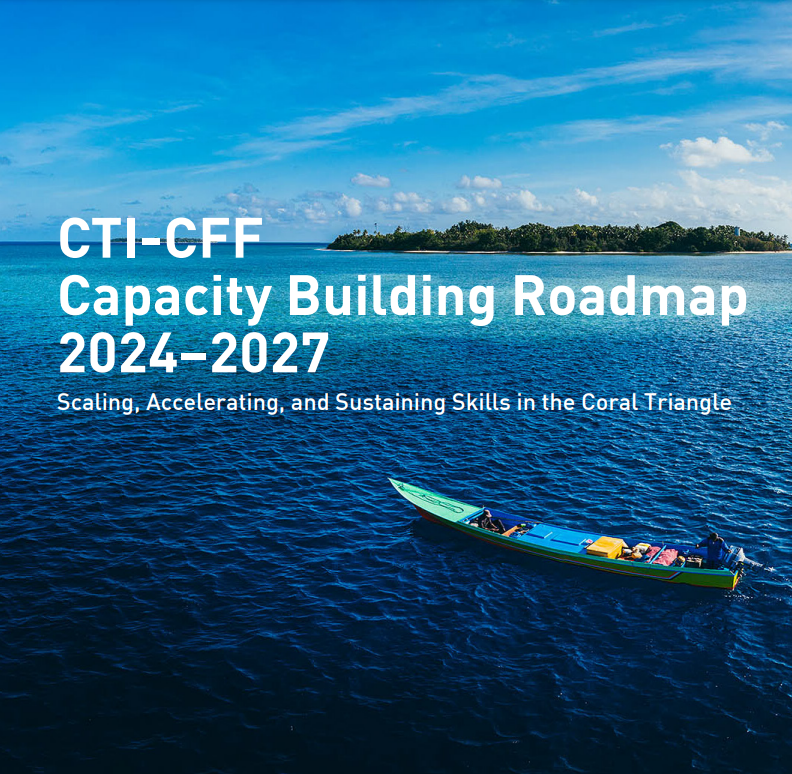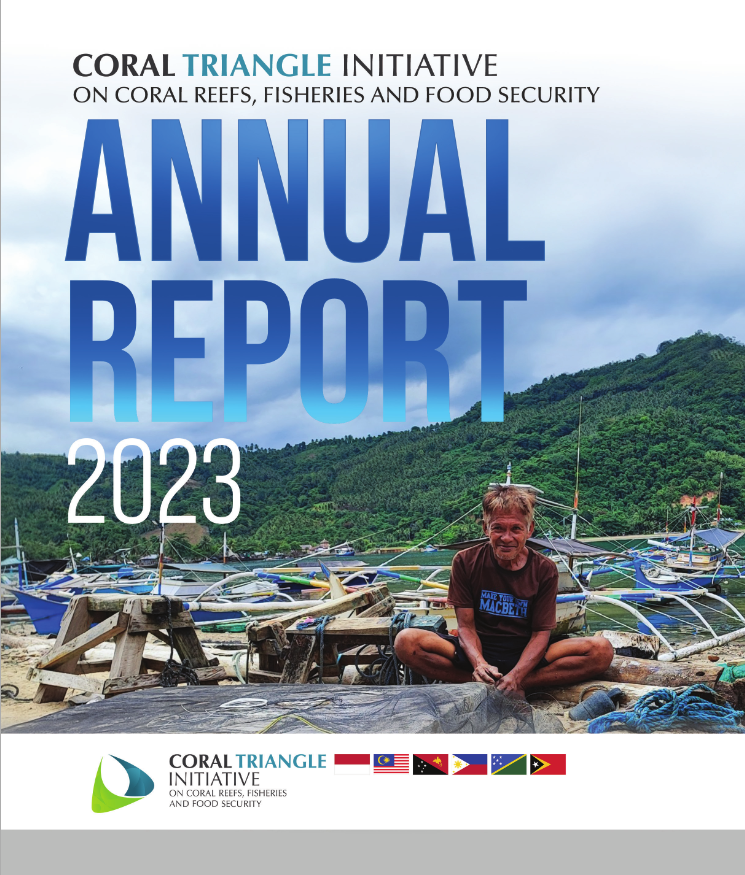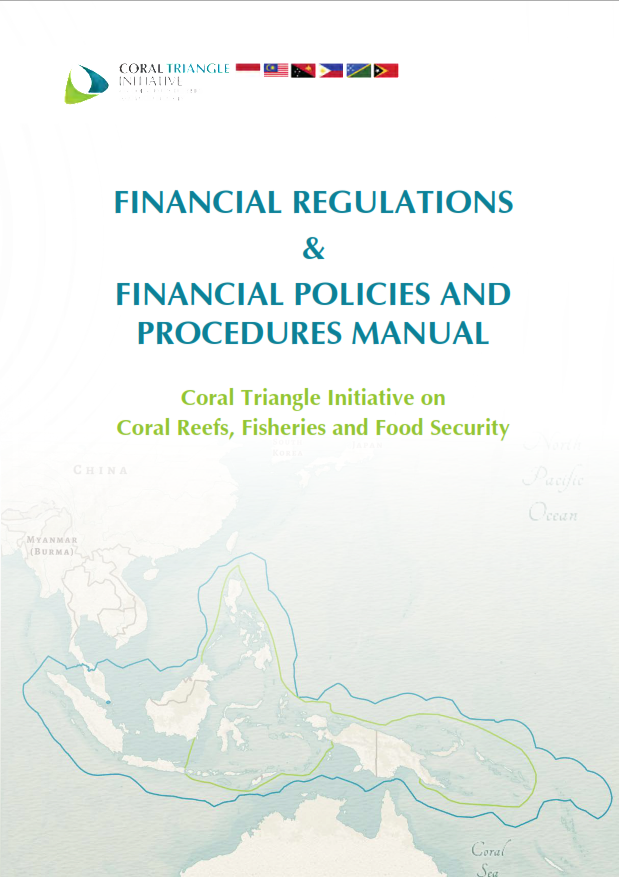Press Release: Local Governments’ Role Crucial in Ensuring Sustainable Fisheries Management
# The Maritime Local Government Network (LGN) of Coral Triangle Initiative on Coral Reefs, Fisheries and Food Security (CTI-CFF) conducted a workshop for the local government executives of Coral Triangle countries namely, Indonesia, Malaysia, Papua New Guinea, Philippines, Solomon Islands and Timor-Leste.
# The LGN is an active network of local mayors and governors who are promoting marine conservation and sustainability in coastal areas within the six Coral Triangle countries.
# As the result of the workshop, the local executives signed the “Jakarta Statement” to affirm their commitment to promote sustainable fisheries by allocating budget; implementing marine spatial planning for small-scale fisheries aquaculture; empowering local communities to manage their coastal and marine resources; and support programs that promote the management and protection of seascapes, marine protected areas, fisheries, climate change adaptation, and threatened species.
JAKARTA, Indonesia 8 May 2018– Recognizing the crucial role of the local government and communities in attaining sustainable fisheries management, the Maritime Local Government Network (LGN) of Coral Triangle Initiative on Coral Reefs, Fisheries and Food Security (CTI-CFF) conducted a workshop for the local government executives of Coral Triangle countries namely, Indonesia, Malaysia, Papua New Guinea, Philippines, Solomon Islands and Timor-Leste.
As the result of the workshop, the local executives signed the “Jakarta Statement” to affirm their commitment to promote sustainable fisheries by allocating budget; implementing marine spatial planning for small-scale fisheries aquaculture; empowering local communities to manage their coastal and marine resources; and support programs that promote the management and protection of seascapes, marine protected areas, fisheries, climate change adaptation, and threatened species.
The LGN is an active network of local mayors and governors who are promoting marine conservation and sustainability in coastal areas within the six Coral Triangle countries. The workshop was intended to develop a plan of action that will help ensure coastal and marine management and protection on the ground. Moreover, it is envisaged to help spread the understanding of Ecosystem Approach to Fisheries Management (EAFM) and encourage more local governments to adopt the concept to ensure sustainability of fisheries activities in the Coral Triangle region.
The Coral Triangle is the epicenter of marine life and biodiversity around the world. Its reefs support an estimated $3 billion worth of fisheries revenue per year and provide livelihoods to about 18 million small-scale fishers and their families. However, natural events such as storm surges and climate change have adversely affected marine and coastal sources. Human activities such as overfishing and destructive fishing practices such as reef dynamiting, cyanide poisoning for fish, pollution from land-based sources have also contributed to the degradation of these resources.
Mr. Agung Kuswandono, Deputy Minister for Coordination of Natural Resources and Services of the Coordinating Ministry for Maritime Affairs of the Republic of Indonesia, underscored in his opening remarks the “necessity of multilateral partnership to work together to safeguard marine and coastal resources and to address issues on food security, climate change and marine biodiversity.”
The LGN recognizes that through the involvement of local governments in the Coral Triangle region, coastal and marine management and protection can be attained and ensured. Local government can conduct community level planning, adopt and implement fisheries management, establish and manage marine protected areas and implement climate change adaptation measures.
The network was formed in 2011 and has since held country-level activities, regional exchanges and forums that aim to encourage and support members to strengthen their policies and projects that protect and sustain the world’s richest marine biodiversity – the Coral Triangle. There are approximately 21 local governments (city, municipality, province, district, local level government and sub-district) in the Coral Triangle countries who are members of the network.
“LGN tries to empower and encourage more mayors to play an active role in protecting the Coral Triangle as well as the millions of lives of people that is at stake. We hope that after this workshop, mayors focus on programs for the development of sustainable fisheries in their localities. For this purpose, LGN aims to encourage local governments to create and encourage enabling conditions for EAFM through the development of policies and regulations,” says I.R Hugua, chair of the LGN and former regent of Wakatobi Regency, Indonesia.
With the network’s assistance, local government leaders throughout the Coral Triangle are able to promote sustainable fisheries and marine conservation in their areas thereby contributing to the goals of the CTI-CFF. These goals, which are enshrined in the Regional Plan of Action, include strong legislative, policy, and regulatory frameworks in place to achieve EAFM; improved income, livelihoods and food security of coastal communities across the region; effective measures in place to help ensure exploitation of shared tuna stocks is sustainable, and a more effective management and more sustainable trade in live-reef fish and reef-based ornamentals.
Ms. Rili Djohani, Executive Director of the Coral Triangle Center (CTC), who is one of the development partners of the LGN, noted the importance of building a strong network of local government leaders who are advocating for sustainable fisheries. “The support of LGN is important to maximize learning and collaboration across boundaries. So far, the LGN has helped train local governments executives since 2011. Moreover, CTC has conducted training for local communities, fisheries extension officers, local government officials and NGOs reaching over 3,000 people in the region,” she said.
To build the local executives’ capacity in understanding EAFM, technical experts and scientists presented and discussed the concept of EAFM including human access, good governance in EAFM, and the role of Marine Protected Areas and Fisheries Management and EAFM in community-based fisheries management.
The workshop was a joint undertaking of LGN, USAID-Regional Development Mission for Asia (RDMA), US Department of Interior, CTC and the Coordinating Ministry for Maritime Affairs of the Republic of Indonesia, in collaboration with the CTI-CFF Regional Secretariat and CTI-CFF National Coordinating Committees with the support of The Nature Conservancy, WWF and RARE.
See the gallery here; http://coraltriangleinitiative.org/content/gallery-local-governments%E2%80%99-role-crucial-ensuring-sustainable-fisheries-management
For more information, please email to regional.secretariat@cticff.org and lgn.coordinator@gmail.com.
-end-
About CTI-CFF
The Coral Triangle Initiative on Coral Reefs, Fisheries, and Food Security (CTI -CFF) is a multilateral partnership of six countries: Indonesia, Malaysia, Papua New Guinea, the Philippines, Solomon Islands, and Timor-Leste (CT6). The CT6 countries work together to preserve marine and coastal resources, and focus on critical key issues such as food security, climate change, and marine biodiversity. The CTI-CFF was established formally during the Leaders’ Summit in 2009 with approval of the leaders from the CT6 countries. They adopted the CTI Regional Plan of Action (CTI RPOA) which is a strategic action plan with five goals: (1) designation of effectively managed seascapes; (2) application of an ecosystem approach to fisheries management; (3) establishment of a fully functional marine protected area system; (4) strengthening climate change adaption and resilience; and (5) improving the status of threatened marine species.
About Regional Secretariat
The Regional Secretariat (RS) of the CTI-CFF is mandated to promote regional cooperation, knowledge sharing, and learning facilities within the six member countries of the Coral Triangle. The RS coordinates and monitors the progress of the implementation of the Regional Plan of Action (RPOA) goals. The RS coordinates and supports official meetings and events linked to the CTI-CFF process, including cross-cutting services in support of monitoring and evaluation, financial coordination, information management and outreach. It also coordinates the implementation of CTI-CFF RPOA and provides support to, and coordination with, NCCs, including advising the CTI-CSO on emerging opportunities and priorities to reaching the goals and targets of the RPOA. The RS also acts as the channel of communication and information sharing and foster networking among the Parties, CTI Partners and other organizations and donors in the efforts to promote the objectives of the CTI-CFF. The Regional Secretariat is currently based in Manado, North Sulawesi, Indonesia.
###
Media Contact:
- Janet Rosalie Anne H. Polita
- Communication & Information Manager CTI-CFF Regional Secretariat
- www.coraltriangleinitiative.org
- jpolita@cticff.org



